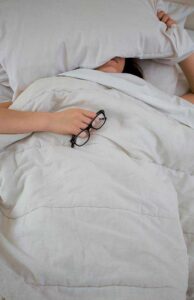Anywhere between 50 to 70 million US adults struggle with a sleeping disorder. Travel nurses are no exception. As a travel nurse, it’s easy to struggle with sleeping habits as you work long hours. Not to mention, moving from one state to another can often leave you with a jet-lag-like sleeping pattern that disrupts your energy, stress, and anxiety levels.
There are so many factors that interfere with sleep, that one can hardly find a one to control them all. However, you can develop healthy sleeping habits to help you find restorative sleep every night. Keep reading for some science-backed tips to get better sleep.
1. Set a Schedule
Having a sleeping schedule is paramount for travel nurses. As your working hours can shift, your time zones vary, and your workdays fluctuate, a sleeping schedule helps you stay consistent. Studies suggest that going to bed and waking up at the same time is beneficial for long-term sleep quality.
For better sleep, consider going to bed and waking up at the same time every day. Keep in mind, this might be challenging at first, but even if all you had was a few hours of sleep, wake up at your scheduled time and work your way up to sleeping seven to eight hours a night.
2. Use Light to Manage Your Circadian Rhythms
You probably know that your circadian rhythms regulate your sleep-wake cycle. It responds to light or darkness exposure, which means how we interact with these throughout the day will impact our sleeping cycle.
Make sure you’re getting enough sun and light exposure during the day to maintain a healthy circadian rhythm. A critical aspect during the winter months and for travel nurses serving in states that have low sun exposure. One study says getting at least two hours of sun exposure a day can improve your sleep patterns by 80 percent.
Additionally, you also want to be wary of blue light at night. Nighttime light confuses your brain, making it believe it’s still daytime, which suppresses the release of melatonin hormones, further disrupting sleep cycles. Stay away from blue light at least two hours before bedtime, and make sure your bedroom is free of any bright lights.
3. Create the Ideal Sleeping Environment
Where we sleep is as essential as every other piece of advice on this list. While as a travel nurse, you won’t always be able to set everything up to your preference, you should try to keep specific guidelines on your bedroom to help you sleep better.
To start, make sure you’re sleeping on a comfortable and supportive mattress. If the one available at your housing location, consider investing in a mattress topper to guarantee comfort. Keep things like external noise, lighting, and temperature controlled. One study believes temperature is the biggest disruptor when it comes to sleep. Keep the room anywhere between 60 to 67 degrees or a temperature that feels cold but comfortable.
4. Watch Your Diet
What you eat during the day can impact your sleeping cycle as well. Stay away from cigarettes, alcohol, and of course, caffeine if you’re struggling with your sleep. If you’re sensitive to caffeine, avoid any consumption of caffeinated foods or drinks after 2 pm.
Additionally, make sure you time your dinners accordingly. Late-night eating can disrupt the natural secretion of melatonin, disrupting your sleeping cycle. However, if hunger strikes, consider a light late-night snack at least 45 minutes before bedtime. Try warm milk, oatmeal, yogurt, mozzarella cheese, crackers with cheddar, or turkey with cream cheese.
5. Find a Sleeping Routine
Work-related worries, lifestyle woes, and other stressful thoughts can mess up with your sleeping schedule. Consider finding the right sleeping technique to signal your brain and body is bedtime. Take a hot bath or shower, try essential oils, practice meditation. Maybe go through a short yoga or stretching routine before heading to bed. Breathing techniques also help.
Find a sleeping routine that works for you, and just as your waking-up and going-to-bed schedule, stick to this routine every day. After a while, your brain will immediately tell you’re getting ready for bedtime and start making you feel more rested and sleepy.
6. Avoid Taking Naps
Skipping daytime naps might be a daunting ask for travel nurses. While naps can be beneficial, they can also confuse your body’s internal clock. The truth is, short and scheduled naps can be helpful and improve brain function. The problem is that long naps — over 30 minutes — make your brain think it’s time for bedtime, leaving you more exhausted than before and hurting your sleeping patterns when it’s time to sleep.
If you have difficulties sleeping at night, avoid daytime napping as much as possible. Instead of crashing in the middle of the day, look forward to a complete sleep session every night.
7. Rule Out Sleeping Disorders
Last but not least, make sure you’re not dealing with a sleeping disorder. If you’re following all the tips outlined before, you even incorporated sleeping aid supplements such as melatonin to your nutrition plan, and you’re still struggling, something else might be happening.
Going back to the start, almost 70 million people in the US have some sleeping disorders. Speak with your primary care physician to look at your options. Maybe it might be time to talk to a sleep therapist and get to the root cause of your poor sleep.






